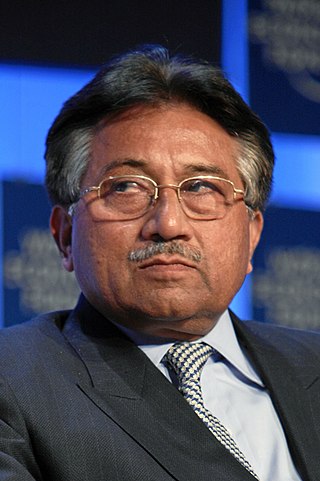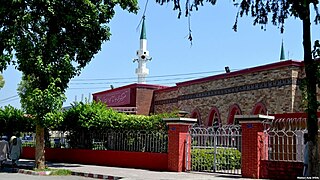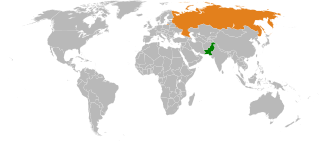Related Research Articles
The foreign relations of Afghanistan are in a transitional phase since the 2021 fall of Kabul to the Taliban and the collapse of the internationally recognized Islamic Republic of Afghanistan. No country has recognised the new Taliban-run government,the Islamic Emirate of Afghanistan. Although some countries have engaged in informal diplomatic contact with the Islamic Emirate,formal relations remain limited to representatives of the Islamic Republic.

The Islamic Republic of Pakistan emerged as an independent country through the partition of India in August 1947 and was admitted as a United Nations member state in September 1947. It is currently the second-largest country within the Muslim world in terms of population,and is also the only Muslim-majority country in possession of nuclear weapons. De facto,the country shares direct land borders with India,Iran,Afghanistan,and China.

Pervez Musharraf was a Pakistani military officer and politician who served as the tenth president of Pakistan from 2001 to 2008.

Makhdoom Muhammad Javed Hashmi,is a Pakistani politician,political realist,and a senior conservative thinker on the platform of Pakistan Muslim League (N).

Air Chief Marshal Mushaf Ali MirNI(M),HI(M),SI(M),SBt was a Pakistani four-star air officer who served as the Chief of Air Staff of the Pakistan Air Force (PAF),appointed on 20 November 2000 until his accidental death in a plane crash on 20 February 2003.

The 1996–2001 Afghan Civil War,also known as the Third Afghan Civil War,took place between the Taliban's conquest of Kabul and their establishing of the Islamic Emirate of Afghanistan on 27 September 1996,and the US and UK invasion of Afghanistan on 7 October 2001:a period that was part of the Afghan Civil War that had started in 1989,and also part of the war in Afghanistan that had started in 1978.

Abdul Sattar,was a Pakistani political scientist,career foreign service officer,diplomat,author of foreign policy,and nuclear strategist.

Air Chief Marshal (ACM) Mohammad Anwar ShamimNI(M) HI(M) SJ SI(M) OI LoM;was a senior air officer of the Pakistan Air Force (PAF) and was the Chief of Air Staff,appointed to the post in 1978 until retiring in 1985.

MawlānāAbdul Rashid Ghazi was a Pakistani Islamic fundamentalist who served as the chancellor of Faridia University. Prior to his death,he served as a diplomat for UNESCO. He was the son of Muhammad Abdullah Ghazi,and younger brother of Abdul Aziz Ghazi.

The siege of Lal Masjid was an armed confrontation in July 2007 between Islamic fundamentalist militants and the government of Pakistan,led by president Pervez Musharraf and prime minister Shaukat Aziz. The focal points of the operation were the Lal Masjid and the Jamia Hafsa madrasah complex in Islamabad,Pakistan.

Inam-ul-Haq is a Pakistani career diplomat who served as the Foreign Minister of Pakistan in the caretaker government of Muhammad Mian Soomro for four months from November 2007 till March 2008.
Events from the year 2006 in Pakistan.

The Soviet Union and Pakistan first established the diplomatic and bilateral relations on 1 May 1948.

Cuba–Pakistan relations refers to the bilateral relations between Cuba and Pakistan. Cuba has an embassy in Islamabad and Pakistan has an embassy in Havana. Relations between the countries strengthened after Cuba provided humanitarian assistance to the victims of the 2005 Kashmir earthquake.
Admiral Abdul Aziz MirzaNI(M) HI(M) SI(M) SBt LoM LoH is a Pakistan Navy former officer who served as the Chief of Naval Staff from 1999 until retiring in 2002,after taking over the command of the Navy following the revolt and resignation Admiral Fasih Bokhari over the appointment of Chairman joint chiefs.

Relations between Algeria and Pakistan are excellent. Pakistan was one of the first countries to recognize the Provisional Government of Algerian Republic and its mission was opened in Karachi,the then capital of Pakistan in 1958. Both sides have convergence of views on issues of international importance. Both countries have also been supporting each other in various multilateral forums including UN,OIC and NAM. Algeria has an embassy in Islamabad and Pakistan has an embassy in Algiers.

Foreign relations between Argentina and Pakistan,have existed for half a century. The relationship has recently grown with important trade ties developing along with other inter-government communications. Pakistan has an embassy in the Buenos Aires,as does Argentina in Islamabad.

Pakistan-Vietnam relations,or Pakistani-Vietnamese relations,refers to the bilateral relationship between the Socialist Republic of Vietnam and Islamic Republic of Pakistan. The relationship is largely based on mutual trade and international political cooperation between the two countries. Pakistan is represented in Vietnam by its embassy in Hanoi,and Vietnam also maintains an embassy in Islamabad. During the Cold War,Pakistan maintained close ties with the United States-led Western Bloc to counter rival India's allegiance with the Soviet Union and Eastern Bloc. Throughout the 1960s and 1970s,the United States was involved in the Vietnam War against Soviet-backed North Vietnam while in the same time period,Pakistan had engaged in two major wars with neighbouring India in 1965 and 1971,the latter of which resulted in a devastating defeat for Pakistan and saw the emergence of an independent Bangladesh. Due to the fact that Pakistan was an ally with the United States and had begun to indirectly wage war against the Soviets in Afghanistan with heavy U.S.−backing,relations became strained between the two,with Pakistan closing its diplomatic mission in Vietnam in 1980 and Vietnam doing the same in 1984. However,relations greatly improved in the 2000s,and Pakistan reopened its embassy in Hanoi in October 2000. Vietnam also reopened its embassy in Islamabad and trade office in Karachi in December and November 2005,respectively. Relations between the two countries have continued to remain friendly,with Vietnam expressing an interest in increased economic and military cooperation with Pakistan. The heads of both nations have in recent times paid official visits to each other,with Pakistani President Pervez Musharraf visiting Vietnam in May 2001 and Vietnamese President Trần Đức Lương also paying an official visit to Pakistan in March 2004. Throughout the following decade,several visits were made by various Vietnamese and Pakistani ministries to each other. A major part of Pakistan's pursuit to enhance its relationship with Vietnam is outlined in Pakistan's "Vision East Asia" strategy. The emergence of such a strategy came as a result of Pakistan's desire to balance its relations with Vietnam and other East Asian / Southeast Asian states by making an effort to circumvent Pakistan's close relationship with China and Vietnam's growing relationship with India—the former being a cause of concern for Vietnam due to its tense relationship with China and the latter being a cause of concern for Pakistan due to its rivalry and history of armed conflict with India.

Pakistan's principal intelligence and covert action agency,Inter-Services Intelligence (ISI),has historically conducted a number of clandestine operations in its western neighbor,Afghanistan. ISI's covert support to militant jihadist insurgent groups in Afghanistan,the Pashtun-dominated former Federally Administered Tribal Areas,and Kashmir has earned it a wide reputation as the primary progenitor of many active South Asian jihadist groups.
References
- ↑ Wall Street Journal: Boosting Aid for Farmers in Afghanistan
- ↑ "Safis Web: Profile: Mohammad Anwar Anwarzai". Archived from the original on 2011-07-18. Retrieved 2011-01-10.
- ↑ Canberra Times, 17 February 2007
- ↑ Sydney Morning Herald: Laws our business, says Afghan envoy
- ↑ [ permanent dead link ]
- ↑ The Nation: 'Musharraf's resignation to strengthen democracy'
- ↑ "All Voices: Afghan ambassador abducted while his driver killed". Archived from the original on 2012-03-28. Retrieved 2011-01-10.
- ↑ "Afghan Foreign Ministry: Afghanistan Presents National Action Plan on Climate Change". Archived from the original on 2011-09-29. Retrieved 2011-01-10.